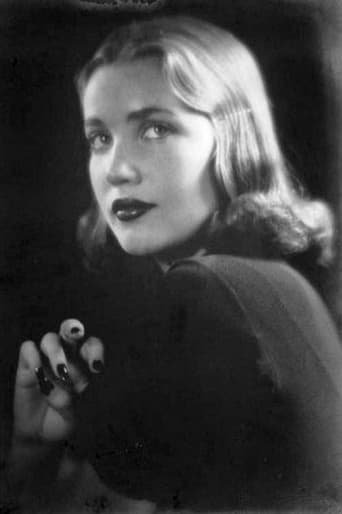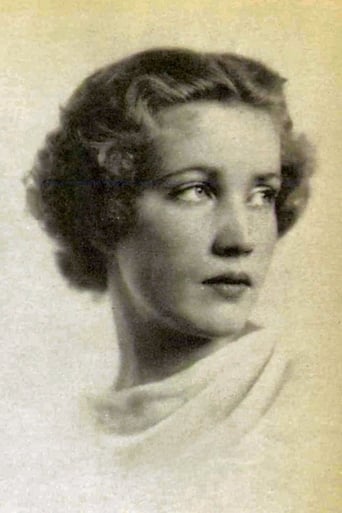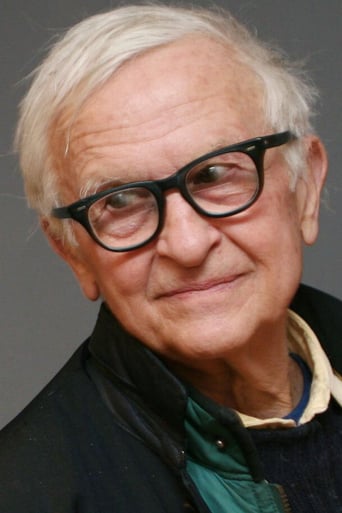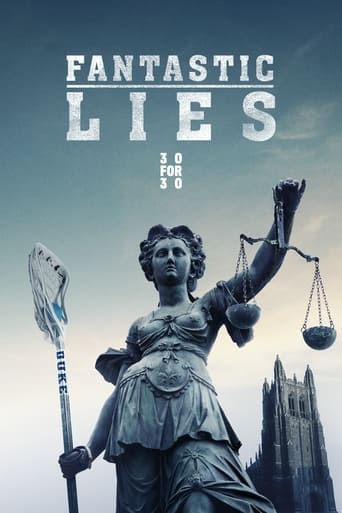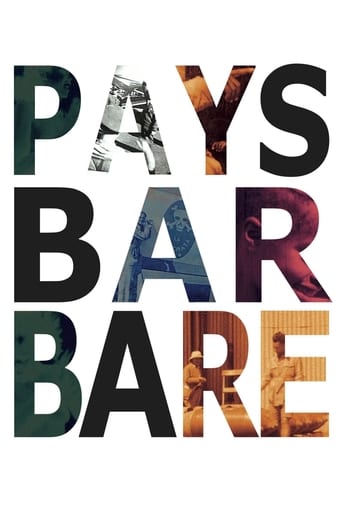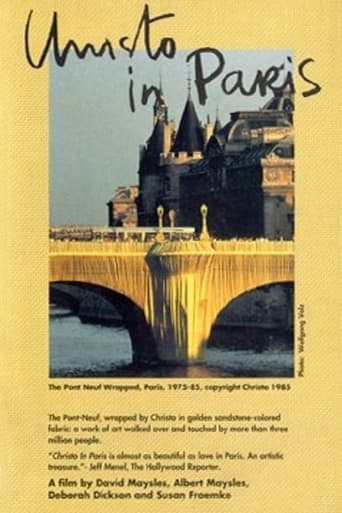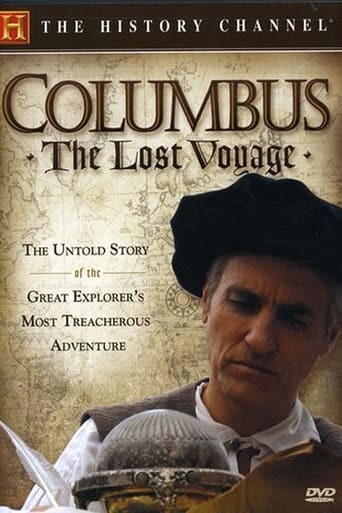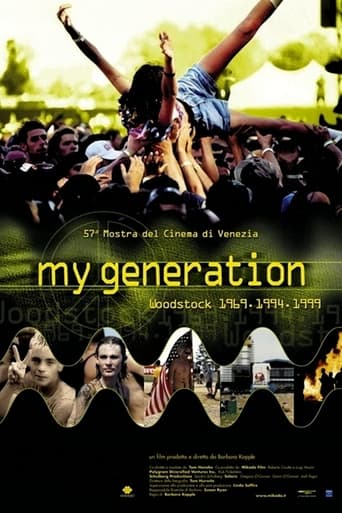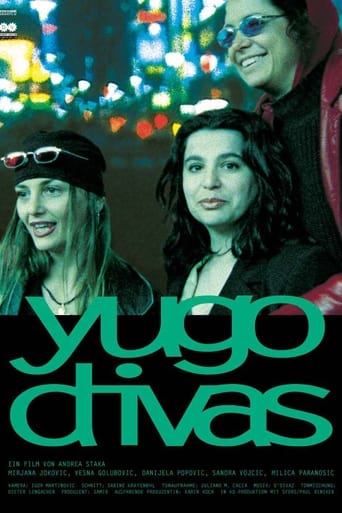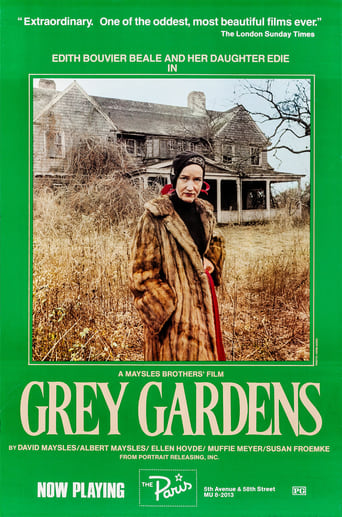
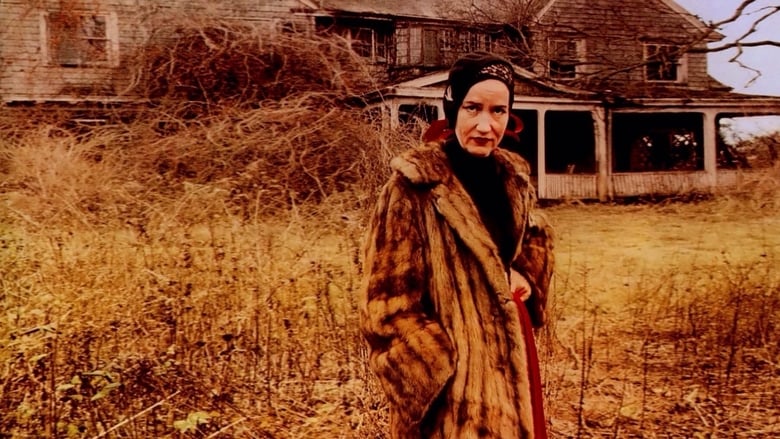
Grey Gardens (1976)
Edie Bouvier Beale and her mother, Edith, two aging, eccentric relatives of Jackie Kennedy Onassis, are the sole inhabitants of a Long Island estate. The women reveal themselves to be misfits with outsized, engaging personalities. Much of the conversation is centered on their pasts, as mother and daughter now rarely leave home.
Watch Trailer
Cast
Similar titles

Reviews
Absolutely brilliant
Easily the biggest piece of Right wing non sense propaganda I ever saw.
There are moments in this movie where the great movie it could've been peek out... They're fleeting, here, but they're worth savoring, and they happen often enough to make it worth your while.
This is a dark and sometimes deeply uncomfortable drama
... such as what happened to the Bouvier/Beale money that bought the 28 room mansion that mother and daughter live in and is in disrepair? I know that Big Edie was divorced in 1931, and it sounded like "little Edie" had the advantages of an expensive education through college, which would have been right before WWII. What changed? There is no narration here, nor do the documentary makers ask questions. They just let the cameras roll and record whatever happens. Big Edie is in her late 70s yet retains a kind of beauty. However, she talks over little Edie whenever they are in the same room, making it difficult to understand either woman.What is clear visually is that they are both living in squalor. A cat defecates behind a very old portrait of Big Edie and both Edies laugh about being glad somebody gets to do what they want? Nobody tries to clean it up. Big Edie spends her time on a filthy mattress with stuff she might need stacked on top, yet seems to have no trouble with mobility. They make food for the cameramen including pate on crackers that looks like cat food on crackers. I would want a tetanus shot first.Little Edie has a mountain of regret. She talks about how she wanted to be a dancer, how somebody wanted to marry her but her mother drove him away, and how she has been taking care of her mother due to her health on and off since the second world war. She mentions how much she hates the country and misses the noise of the city. Little Edie is remarkably well preserved. When this film was made she was 56 but she could pass for forty. She color coordinates all of her wardrobes including her scarves and headdresses that hide her alopecia, yet she won't mop the floor. Shades of faded feelings of being aristocracy perhaps? Another question I had that went unanswered was where were big Edie's sons? Both lived into the 1990's, yet they are nowhere to be found. Maybe they had the sense to get out of Dodge.Why are these recluses the subject of a documentary in the first place? Because big and little Edie are Jackie Kennedy Onnasis' aunt and cousin, respectively, and because Suffolk County was trying to evict them based on the condition of the house and grounds - there was no running water at one point - until Jackie supplied the funds to get the estate up to snuff.Don't look for lots of answers here, because there are really none. It is just a fascinating portrait of two recluses who have slipped into their own form of normality although it looks horrifying to outsiders.
The documentary Grey Gardens, directed by the Maysles brothers was a groundbreaking installment of the cinema verite film movement. Edith and Edie Beale were eccentric people, and the Maysles took advantage of that with them being the subjects of Grey Gardens. There is no topic or lesson to be taught to the audience, rather it is like a peek into the daily life of of two co-dependent, sheltered women inside their dirty, dilapidated mansion.The heart of the film is the toxic relationship between a mother and daughter. Edie constantly confides to the camera that she "can't take another winter here in the country" and yet doesn't leave, and hasn't for twenty-five years. Her mother said "You can't have freedom when you are being supported", which resonated as a driving factor for why Edie is trapped in her forlorn life. Edie is stuck in the past, and obsessed with being famous and beautiful. She revels in the camera's attention, as if she finally got her big break that she gave up years ago to care for her mother. Their bickering and backwards conversations flanked by piles of filth and feral animals is sickening, but a depressingly true reality for these women obsessed with what could have been.
If creepy-as-s**t "aristocratic" Americans attachment disorders were McDonald's happy meals, Foxcatcher would be for the boys while Grey Gardens would be for the girls... weird analogy, perhaps, until you realize that one of the Bouvier/Beales (or both) knew the Duponts, and one of their photos is pointed in the film out as being shot by those other delightful bunch of blue bloods.This is the original 'Hoarders', a reality show before that concept had polluted the TV airwaves, only here given a natural boost and clarity by the Maysles brothers - they're unmistakable as being part of this whole thing and even try to sing along once or twice in good favor with these wombats - and thus they are all-too human depictions of decay and disorder. You might almost think going on, as I did, mistakenly, that there may be some laughs to be had, whether at their expense (cruel, but it's part of the whole Schaudenfreude thing with reality TV) or with them (a few of the elder Edith's observations are funny in a scathing way).But it's not really. This is a disturbing film precisely because the Maysles just show the place for how it is. And yet it also has some good historical context amid the mother and daughter squabbling (which makes up a good 55% of the film) - just one panning shot across the various homes along the Long Island sound, homes that were very likely at one time the sort one saw in Gatsby, speaks a lot of words.It's meant to be uncomfortable many times, though there's a lot of tragedy in the air as well. 'Little Edie' may or may not be here against her will in a way; but then the questions arise, and one goes into another. One might ask, why doesn't she just leave? Well then, who would take care of her mother? Maybe it's her mother's 'time' to go to a "home" for the elderly - her eyesight is quite terrible, and though she has some of her marbles she spends much of her time singing (not terribly, it should be noted) to old show-tunes and petting and feeding the stray cats. But then why even keep the house at all? Memories, perhaps. Or just the whole 'Old-Money' thing that came with being the cousin of the former wife of the president of the USA. Marriage is brought up a lot in the film - failed ones, (semi) successful ones, relationships that could have been that Little Edie resents her mother for, and her mother just thinks 'Eh, whatever'. In a way it's almost like the Maysles have no choice but NOT get in the way of these women. They only ask a question here and there to move a thought forward, not to press any point. Clearly, as one can see in Grey Gardens, these ladies can do that all on their own. Of course the house itself is another character, a gangly and rancid thing in the midst of "All those leaves" (as Little Edie points out) looking like something that should at BEST be considered for a *good* cleaning and at worst should be burned to the ground (those cute raccoons in the attic optional). Ultimately, the power of this creepy saga of the underbelly of the upper class is sometimes very hard to watch or take in, but that's the idea. After five minutes you'll either know to go along for the other hour and a half with these pieces of work, or not. I did, and I'm glad I did - whether I return, I'm not sure.
Living in the neighborhood, one did hear about these two old birds, the aunt and cousin of Jacqueline Bouvier Kennedy Onassis. You hardly ever saw them, but heard they resided amongst trash and cat feces. The house looked old and neglected. Nobody mowed the lawn. It would never win first prize in the annual L.V.I.S. (Ladies Village Improvement Society) competition. The place looked deserted whenever you walked by, and the Beales were not spotted around town.In this film, "Little Edie" and mother "Big Edie" are seen sunning on the grounds. Inside, they are quite lively, singing and dancing for the exploitive cameras. Obviously, the Beales are animated for the Maysles brothers. Viewing the inside of the house reveals it wasn't as dirty as legend claimed. There were not dozens of cats in evidence, only a manageable few. They "adopted" our family cat once. Thankfully, he wore a collar listing the name "Scribble" and our telephone number...Mrs. Onassis called, and my mother handed me the phone. Probably, she knew I would get a kick out of talking to Jackie Kennedy. In her distinctive voice Jackie said, "We have your cat, Scribble." Edie Beale has a similar voice. We went over to get the cat. Jackie was not staying at "Grey Gardens", she was in a nicer place on Lily Pond Lane. Periodically, she and sister Lee Radziwill would try to help their eccentric relatives clean up, and return the "adopted" cats to their homes.****** Grey Gardens (9/27/75) David Maysles, Albert Maysles ~ "Little Edie" Bouvier Beale, "Big Edie" Bouvier Beale

